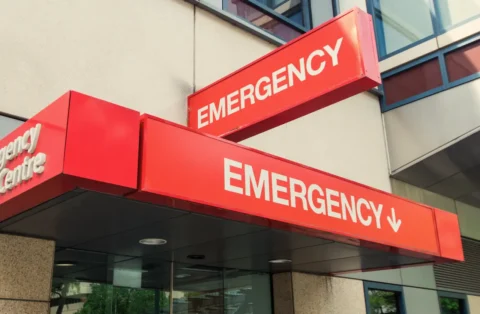What you’ll learn
This guide walks you through the five stages of addiction recovery, what each phase looks like, and how therapy, support, and treatments like Suboxone® can help. You’ll also learn why relapse doesn’t mean failure and how progress often comes from persistence, not perfection.
Recovery doesn’t happen overnight. It builds gradually through small choices, new insights, and hard-earned progress. Whether you’re just beginning to explore the idea of getting help or you’re already working to rebuild your life, understanding the stages of addiction recovery can help you feel more prepared and less alone.
At QuickMD, our work with patients in recovery has shown us just how complex and courageous this journey can be. Through telemedicine treatment, Suboxone® care, and ongoing support, we’re here to walk alongside you, wherever you are in the process. We understand that addiction affects every part of life, and we’re here to help you take control of your health.
Most recovery journeys follow a general framework often referred to as the five stages of change, based on the Stages of Change Theory, or the Transtheoretical Model (TTM). The Stages of Change Theory outlines how people move from denial or resistance to planning, action, and long-term recovery, recognizing that relapse and non-linear progress are normal parts of healing.
Each stage comes with its own emotional challenges and breakthroughs. Some days may feel like progress; others may feel uncertain. That’s normal. What matters is that recovery is possible, and you don’t have to do it perfectly to keep moving forward.
In this guide, we’ll walk through each of the stages of recovery, explain what they look like in real life, and share how support, whether it’s therapy, medication, or community, can make a real difference.
If you’re wondering what to expect in addiction recovery, you’re in the right place.
Stage 1: precontemplation, not ready yet
In the precontemplation stage, you may not believe you have a problem, or you may be aware of it but feel resistant to change. In short, there’s no intention of change.
Denial, shame, or fear can make it hard to imagine a life without substances, especially if opioids have been a coping mechanism for years.
If you’re in this stage, you might find yourself saying things like:
- “I don’t need help.”
- “It’s not that bad.”
- “I can quit anytime I want.”
Sometimes, holding on to familiar patterns feels safer than facing change. That doesn’t mean you’re failing. It means you’re human.
People in precontemplation often do what they can to avoid pain or confrontation. That doesn’t mean change isn’t possible. In fact, just becoming aware of these thoughts is a sign that your mindset might be shifting.
If you’re reading this, you’ve already started. Awareness is often the first sign of courage.
What helps during the precontemplation stage of addiction recovery
You don’t have to be ready to quit to have a conversation. Just talking it through with someone can start to shift things.
Motivational Interviewing (MI) works particularly well during precontemplation. This counseling approach creates space to explore your relationship with substances without demands or ultimatums.
Instead of being told what you should do, you get to examine whether your current coping strategies still serve your long-term goals.
Stage 2: contemplation, acknowledging the problem
Something shifts during the contemplation stage. You begin acknowledging that substances might actually be causing problems in your life.
This stage might feel complicated because you’re genuinely torn. Part of you recognizes the problems, while another part still sees benefits or feels afraid of what change might mean.
There’s more internal dialogue happening. Questions like:
- “What would life look like without opioids?”
- “How much control do I really have over this?”
- “What’s holding me back from making a change?”
This stage can stretch on. You might feel conflicted. Part of you is ready for change, part of you is holding back. That’s completely normal. Just thinking about change is progress. Give yourself credit for showing up and being honest with yourself.
What helps during the contemplation stage of addiction recovery
Reflective therapy methods, like Motivational Interviewing and Cognitive Behavioral Therapy (CBT), are especially effective at this point. These approaches help clarify your goals, challenge unhelpful thoughts, and identify what really matters to you.
You don’t have to go through it alone. We offer same-day access to licensed counselors who can help you sort through these conflicting thoughts and begin mapping out a path forward.
No pressure, just support.
Stage 3: preparation, getting ready to change
Something important has shifted by the time you reach the preparation stage of addiction recovery. The thinking and weighing options part is giving way to actual planning for a future without opioids.
That might mean telling someone you trust, researching treatment options, or setting a quit date.
This stage involves moving from thought to action, even if the steps feel small.
You might begin:
- Looking into therapy or a support group
- Asking questions about medications like Suboxone®
- Considering how to adjust your routines or environment
You’re starting to picture life in recovery, and you’re getting ready to take the first real steps toward it. It’s the point where belief starts turning into action.
What helps during the preparation stage of addiction recovery
Structure and planning. A counselor or recovery coach can work with you to set realistic goals, identify potential obstacles, and build a support system.
This is also a good time to learn more about Medication-Assisted Treatment (MAT), which combines FDA-approved medications like Suboxone® with therapy to support recovery. At QuickMD, you can start MAT from home with a licensed provider.
You might begin exploring therapy, asking questions about medications like Suboxone®, or looking into resources to help you stay motivated. Our blog offers helpful articles on recovery strategies, MAT, and emotional wellness.
Stage 4: action, committing to recovery
This is where everything you’ve been thinking and planning finally becomes visible to the world around you. The action stage of addiction recovery means moving beyond preparing for change and you’re living it every single day.
Many people in this stage benefit from combining therapy with medications like Suboxone®. We help make this possible through our virtual MAT program designed for real-life recovery.
It’s a time of transformation, but also one that requires persistence and support. You’re building new habits, confronting triggers, and learning healthier coping methods.
What this stage of addiction recovery often looks like
- Attending regular therapy sessions or group meetings
- Taking medications like Suboxone® as prescribed
- Creating boundaries with people, places, or situations tied to substance use
- Developing new routines that support physical and mental well-being
You don’t need to do everything here. Even accomplishing one is a huge step. But if there’s one thing the data makes clear, it’s this: incorporating Medication-Assisted Treatment (MAT) offers the best odds for long-term recovery.
What helps during this stage of addiction recovery
Accountability and community. Recovery isn’t something you have to do alone.
Having a solid team (like a counselor, peer support group, or healthcare provider) can make a huge difference. It’s also normal to feel challenged at times. Cravings, doubts, and stress may still show up. The key is learning how to respond rather than react.
You don’t have to get everything right. Keep showing up. Every effort you make is part of your healing.
Need support at any stage? At QuickMD, we offer same-day virtual Suboxone® treatment and counseling. Our care is discreet, affordable, and on your schedule.
Stage 5: maintenance, staying on track
Maintenance might sound like you’re just coasting, but it’s actually one of the most critical stages of recovery.
By now, you’ve put in serious work building new habits, developing coping strategies, and creating a life that doesn’t revolve around substances. If you’re in this stage of addiction recovery, take a moment to think about how far you’ve come and how amazing this accomplishment is.
Maintenance might be attending support meetings regularly, taking your Suboxone® as prescribed, practicing stress management techniques, or maintaining relationships with people who support your sobriety goals.
In short, the maintenance stage is about protecting and strengthening the foundation you’ve worked so hard to create.
It’s also about sustaining the work, staying aware of triggers, and continuing to prioritize your mental and physical well-being. This stage may last years, and that’s okay. The longer you maintain it, the stronger your foundation becomes.
What this stage of addiction recovery often looks like
- Continuing therapy or support groups at a pace that works for you
- Navigating stress or life changes without returning to substance use
- Supporting others in their recovery journey
- Experiencing fewer cravings or urges over time
What helps during the maintenance stage of addiction recovery
Resilience and reflection. Maintenance doesn’t mean you’ll never have a hard day. It means you’ve built the tools to handle one when it comes. Staying connected to your support system, celebrating milestones, and checking in with yourself regularly are all part of long-term recovery.
Many people in recovery face setbacks, and with the right support, they continue moving forward.
The 5 stages of addiction recovery: what each stage looks like
| Stage of Recovery | What It Involves | Real-Life Signs |
| Precontemplation | The individual does not yet recognize a substance use problem. | Denial, defensiveness, and avoidance of conversations about addiction. |
| Contemplation | Awareness of the addiction begins, but uncertainty about change remains. | Thinking about quitting, mixed feelings about recovery. |
| Preparation | The person decides to make a change and starts planning the next steps. | Researching treatment, reaching out for support, and setting goals. |
| Action | Active steps are taken toward addiction recovery. | Starting therapy, joining a program, and making lifestyle changes. |
| Maintenance | Focus shifts to long-term recovery and relapse prevention. | Ongoing counseling, healthy routines, and support group involvement. |
What about relapse?
Relapse isn’t the end of the road, it’s often part of the process. According to the Stages of Change Theory, recovery isn’t a predictable, linear path. Many people cycle through the stages more than once, especially early on.
A return to substance use might bring someone back to contemplation or preparation, not all the way to the beginning. A slip doesn’t mean you’ve failed. It’s a signal to pause, reflect, and renew your support systems.
Research shows that most people make more than one attempt before reaching long-term recovery, and that’s okay. Interestingly, it’s not as many people as you might think. A national study found that while the average number of serious recovery attempts was around five, the typical person needed just two. That means lasting change often happens sooner than we expect.
What matters isn’t how many times you begin; it’s that you stay engaged even when it’s tough, you continue learning, and you keep moving forward.
Recovery is a journey, and you don’t have to walk it alone
These stages of recovery don’t always unfold in perfect order. Real life doesn’t follow textbook patterns.
You might find yourself moving back and forth between stages of addiction recovery, maybe struggling in one phase for longer than expected, or discovering that your path looks completely different from someone else’s.
That’s not failure. That’s just how genuine change happens for most of us.
Whether you’re just beginning to wonder if you have a problem, actively working on changing old patterns, or celebrating months or years of sobriety, every single step you take toward healing counts.
Asking hard questions about your substance use, showing up to therapy appointments, rebuilding relationships, and learning healthier ways to cope with stress–all this work matters, even when progress feels impossibly slow.
No matter where you are on the path, our providers are here to help you do that, whether you need medication, therapy, or simply a place to start. You don’t have to do it alone, and you don’t have to do it perfectly. Remember, beginning is an act of courage.
Frequently asked questions about the stages of recovery
How do I know if I’m ready for treatment or MAT?
Readiness doesn’t always feel like total confidence. If you’re starting to question your relationship with substances, feel concerned about the impact on your life, or are curious about treatment options, you may be more ready for opioid addiction recovery than you think.
Services like QuickMD can help assess your needs and determine if MAT or therapy is a good fit. Remember, no pressure, just support.
What is the hardest stage of sobriety?
It depends on the person, but you may find the action stage (stage 4) the most difficult. That’s when real change begins: starting therapy, avoiding triggers, and coping without substances.
It’s a time of meaningful progress, but also deep vulnerability. That’s why support matters so much. Cravings, emotional ups and downs, and life stressors can all feel overwhelming. Support (a therapist, a support group, or treatment like MAT through services like QuickMD) can make this stage much more manageable.
How do I talk to loved ones about my recovery?
It can be tough, but openness can help build understanding and support. Start with honesty about your goals and needs. You don’t have to share everything, just enough to let them know you’re working toward something important.




